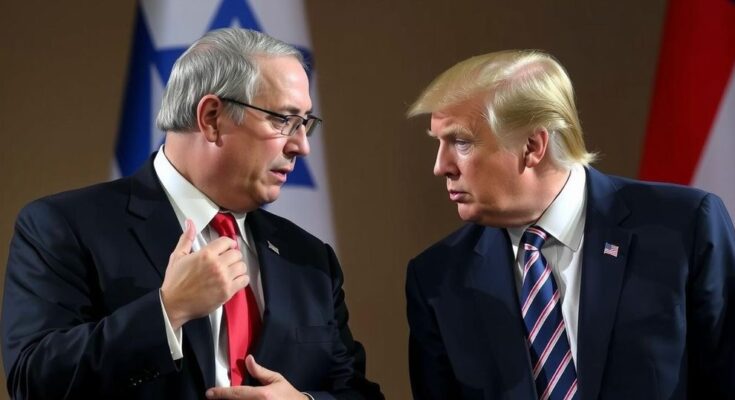Israeli Prime Minister Benjamin Netanyahu has stated that he and U.S. President-elect Donald Trump are aligned on their views concerning Iran, emphasizing a strong commitment to their alliance. Following military strikes between Israel and Iranian proxies, recent violence has resulted in significant casualties in both Lebanon and Gaza. With an incoming U.S. administration, global observers are keenly focused on how these relationships and regional tensions will evolve.
Israeli Prime Minister Benjamin Netanyahu has expressed alignment with U.S. President-elect Donald Trump regarding their shared concerns over Iran. In a statement released on Sunday, Mr. Netanyahu shared that he has engaged in three discussions with Mr. Trump since the recent election, focusing on fortifying the partnership between Israel and the United States. He stated, “We see eye to eye on the Iranian threat in all its components, and the danger posed by it. We also see the great opportunities before Israel, in the field of peace and its expansion, and in other fields.” The ongoing tensions in the region persist as Israel and Iran have exchanged military strikes over the past year, particularly following the escalation of hostilities between Israel and Hamas. Iranian proxy groups, including Hamas, Hezbollah, and the Houthi rebels, have targeted Israeli and Western interests throughout the region as part of a coordinated response to the crisis in Gaza. As President Joe Biden prepares to meet Israeli President Isaac Herzog, the changing U.S. administration holds significance for the regional dynamics and the future of Israeli-Iranian relations. Recent Israeli airstrikes in Lebanon and northern Gaza resulted in substantial casualties, including multiple fatalities among civilians. An airstrike in Aalmat village near Beirut reportedly killed 23 individuals, including seven children, prompting statements from Israeli Defence Minister Israel Katz asserting that Israel has successfully countered the capabilities of Hezbollah. Additionally, an Israeli strike in Jabaliya refugee camp in northern Gaza confirmed at least 17 deaths. Meanwhile, there are grave warnings from food security monitors regarding potential famine conditions in northern Gaza. These developments further complicate the geopolitical landscape as global observers await to see how the U.S. response to these issues evolves under the new administration.
The article discusses the ongoing geopolitical tensions between Israel and Iran, highlighting the recent statements made by Israeli Prime Minister Benjamin Netanyahu expressing his alignment with U.S. President-elect Donald Trump regarding their mutual concerns over the Iranian threat. The context includes a series of military engagements between Israel and Iranian proxies, particularly within the scope of the broader conflict involving Hamas, Hezbollah, and regional instability. The significance of the upcoming U.S. administration’s policies on Israeli-Iranian relations is also a focal point, amidst rising concerns over humanitarian crises in Gaza and Lebanon. Netanyahu’s comments reflect an ongoing strategic dialogue aimed at reinforcing U.S.-Israel relations during a period of uncertainty surrounding U.S. foreign policy. As both leaders perceive similar threats emanating from Iran, their cooperative stance may influence the broader regional balance of power and responses to Iranian influence.
In conclusion, the relationship between the United States and Israel appears to be reaffirming under the leadership of Prime Minister Netanyahu and President-elect Trump, particularly concerning the challenges posed by Iran. The ongoing military confrontations in the region, notably involving proxies like Hamas and Hezbollah, are expected to dictate the pace and tone of U.S. foreign policy in the Middle East. The humanitarian crises resulting from these conflicts further complicate the issue, highlighting the urgent need for a comprehensive strategy addressing both geopolitical and humanitarian concerns.
Original Source: news.sky.com




